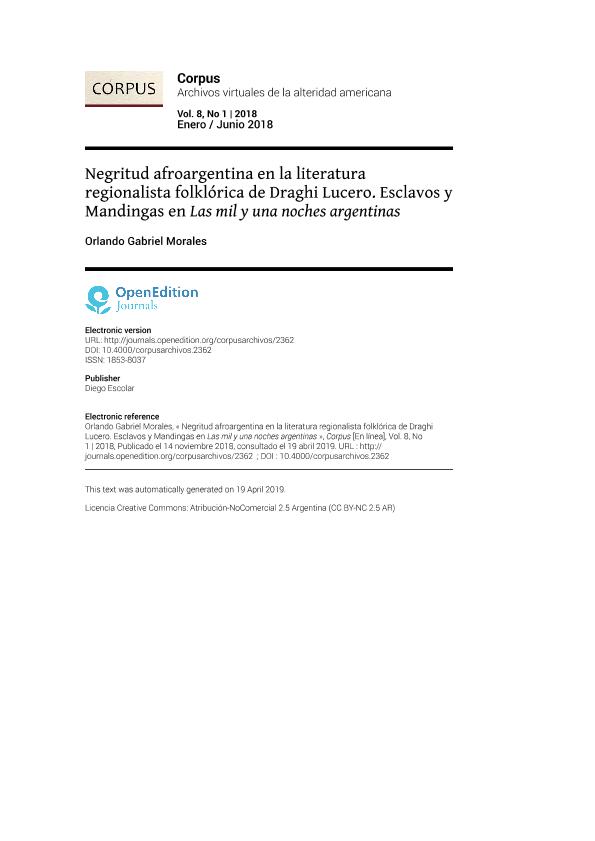Mostrar el registro sencillo del ítem
dc.contributor.author
Morales, Orlando Gabriel

dc.date.available
2020-01-09T13:14:18Z
dc.date.issued
2018-06
dc.identifier.citation
Morales, Orlando Gabriel; Negritud afroargentina en la literatura regionalista folklórica de Draghi Lucero. Esclavos y Mandingas en Las mil y una noches argentinas; D. Escolar; Corpus; 8; 1; 6-2018; 1-20
dc.identifier.issn
1853-8037
dc.identifier.uri
http://hdl.handle.net/11336/94100
dc.description.abstract
Este artículo examina las representaciones de la negritud afroargentina en "Las mil y una noches argentinas" (Draghi Lucero, 1940), una obra referente y destacada de la literatura regionalista de inspiración folklórica de Cuyo, del período 1930-1940, que contribuyó a configurar una identidad cuyana. El trabajo contextualiza "Las mil y una noches argentinas" en la trayectoria de Juan Draghi Lucero en las disciplinas del folklore, la historia y la literatura, y pone en diálogo su obra literaria con el criollismo, el nacionalismo y regionalismo cultural de fines del siglo XIX y principios del XX. El análisis expone una narrativa que asume un mesticismo, un folklore y una cultura popular cuyana con énfasis en el aporte precolombino y español, excluyente del elemento africano. También que reproduce ideas comunes de intelectuales argentinos sobre la esclavitud y los africanos esclavizados. Respecto a esto, se identifican dos asociaciones que concatenadas contribuyen a la premisa de la desaparición de los negros argentinos en el siglo XIX: una, entre esclavitud y negros africanos, situados éstos en la sociedad colonial y concebidos como sujetos pasivos beneficiados por relaciones recíprocas de fidelidad/solidaridad con los amos; y otra, menos evidente y más alegórica, entre el fin de la esclavitud o la obtención de la libertad de los esclavos y la desaparición física de los negros. Asimismo, la narrativa apela a estereotipos sociales como la identificación de los negros argentinos con el federalismo y mitos tradicionales de la cultura occidental como la representación del diablo como un hombre negro.
dc.description.abstract
This article examines the representations of Afro-Argentinean negritude in Las mil y una noches argentinas (Draghi Lucero, 1940), a reference and outstanding work of Cuyo's folkloric-inspired regionalist literature, from the 1930-1940 period, which contributed to postulate an Cuyana identity cuyana. The work contextualizes Las mil y una noches argentinas in the career of Juan Draghi Lucero in the disciplines of folklore, history and literature, and puts his literary work in dialogue with the criollismo and nationalism and cultural regionalism of the late nineteenth century and early twentieth. The analysis exposes a narrative that assumes a mesticismo, a folklore and a Cuyo popular culture with emphasis on the pre-Columbian and Spanish contribution and excluding the African element. It also reproduces common ideas of Argentine intellectuals about slavery and enslaved Africans. Regarding this, two associations are identified that concatenated contribute to the premise of the disappearance of Argentine blacks in the nineteenth century: one, between slavery and African blacks, located in colonial society and conceived as passive subjects benefited by reciprocal relations of fidelity / solidarity with the masters; and another, less evident and more allegorical, between the end of slavery or the obtaining of the freedom of the slaves and the physical disappearance of the blacks. Likewise, the narrative appeals to social stereotypes such as the identification of Argentine blacks with federalism and traditional myths of Western culture as the representation of the Devil as a dark man.
dc.format
application/pdf
dc.language.iso
spa
dc.publisher
D. Escolar
dc.rights
info:eu-repo/semantics/openAccess
dc.rights.uri
https://creativecommons.org/licenses/by-nc-sa/2.5/ar/
dc.subject
NEGRITUD AFROARGENTINA
dc.subject
INVISIBILIZACIÓN
dc.subject
REGIONALISMO LITERARIO
dc.subject
FOLKLORE CUYANO
dc.subject.classification
Estudios Generales de Literatura

dc.subject.classification
Lengua y Literatura

dc.subject.classification
HUMANIDADES

dc.title
Negritud afroargentina en la literatura regionalista folklórica de Draghi Lucero. Esclavos y Mandingas en Las mil y una noches argentinas
dc.type
info:eu-repo/semantics/article
dc.type
info:ar-repo/semantics/artículo
dc.type
info:eu-repo/semantics/publishedVersion
dc.date.updated
2019-10-22T13:40:19Z
dc.journal.volume
8
dc.journal.number
1
dc.journal.pagination
1-20
dc.journal.pais
Argentina

dc.journal.ciudad
Mendoza
dc.description.fil
Fil: Morales, Orlando Gabriel. Consejo Nacional de Investigaciones Científicas y Técnicas. Centro Científico Tecnológico Conicet - Mendoza. Instituto de Ciencias Humanas, Sociales y Ambientales; Argentina
dc.journal.title
Corpus
dc.relation.alternativeid
info:eu-repo/semantics/altIdentifier/url/https://journals.openedition.org/corpusarchivos/2362
dc.relation.alternativeid
info:eu-repo/semantics/altIdentifier/doi/http://dx.doi.org/10.4000/corpusarchivos.2362
Archivos asociados
